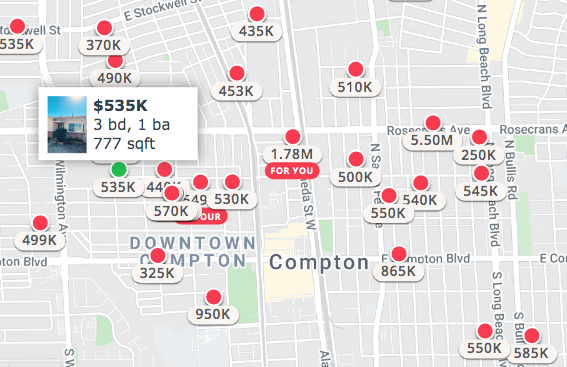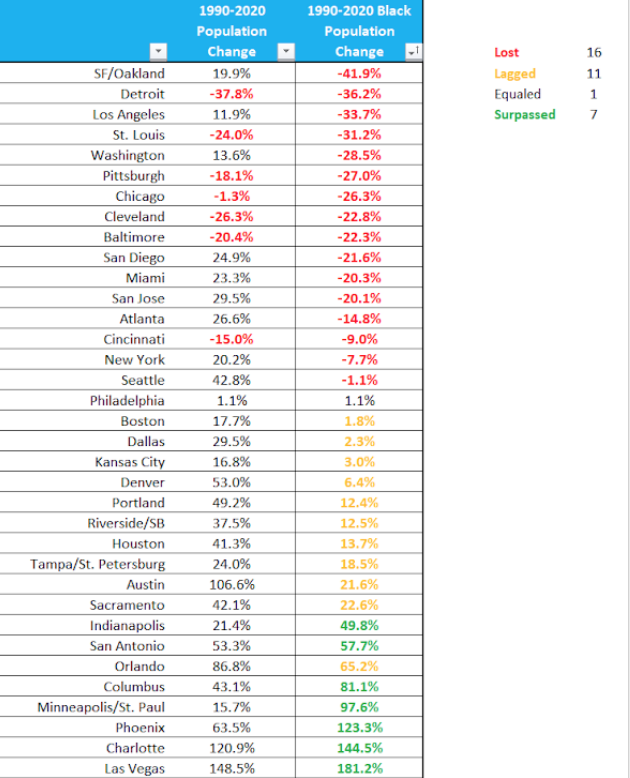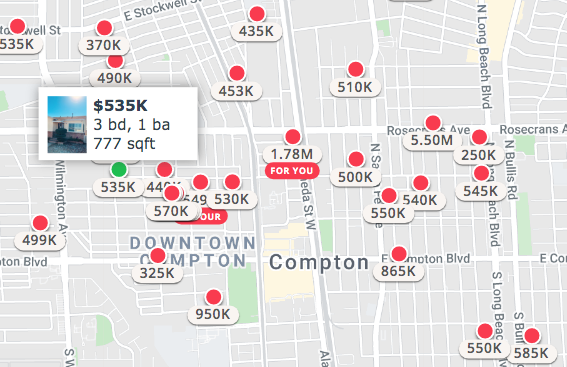
I recently ran across an interesting table showing population change in the major cities (core city only, not suburbs), as well as the change in the African-American population since 1990:

A few patterns stand out:
1. Some of the older rust belt cities have seen major declines in both overall population and African-American population.
2. Many cities located near a coast have seen their overall population rise even as the black population declined sharply. Many of these cities have very expensive real estate.
3. Booming cities that are far from the coasts often have a fast-growing black population and moderate real estate prices.
I find these patterns to be interesting, as the coastal cities are often governed by progressives that are sympathetic to the Black Lives Matter movement. So why are blacks leaving those areas?
There could be numerous reasons, but one factor is surely NIMBY housing regulations. These cities tend to have much more regulated housing markets than places such as Houston. And this goes beyond zoning; there are often very strict environmental rules that force builders to jump through numerous hoops to get a project approved. These long delays are very costly to developers, and they actually hurt the environment. More density means less sprawl.
The black population is declining especially rapidly in a number of cities in California. Older readers may recognize the title of this post as a nod to a classic rap album from the 1980s, which itself referenced a black area in south central Los Angeles. Take a look at a recent Zillow screenshot of Compton:

If a small ranch house in a high crime neighborhood costs roughly 1/2 million dollars, is it any wonder that working class blacks are moving straight out of Compton and toward more affordable metro areas? Progressives in places like LA need to understand that it does no good to place a politically correct sign in your front yard if your housing policies are implicitly sending the message that “black lives matter . . . somewhere else”.
PS. Be aware that overall metro area migration patterns may differ from the table above, especially for places (such as Atlanta) where the core city has only a small share of the metro population. In many areas there’s been significant migration of blacks to the suburbs. But at least in the case of California, even at the statewide level the share of blacks has fallen significantly since 1990.
PPS. Don’t think in terms of whether poor and working class blacks could afford new construction in west LA. That’s not the point. Think about how a boom in new construction would reduce pressure to gentrify marginal neighborhoods such as Compton. Many of LA’s expensive little ranch houses are teardowns, which will be replaced with new construction.

READER COMMENTS
Alan Goldhammer
Feb 10 2022 at 2:07pm
This is a bit misleading as some of what are listed in the table are metro areas such as SF/Oakland. I would be surprised if black population of Oakland changed at all and it may be that the difference observed is because of San Francisco. Tampa & St Petersburg should be parsed out as well. For California, one should revisit this data in several years now that accessory dwelling units are permitted by law and will increase the stock of new housing.
Philo
Feb 10 2022 at 5:12pm
I suspect your comment was made before Scott added his ‘P.S.’, in which case he might have credited you.
Scott Sumner
Feb 10 2022 at 7:04pm
Oakland has gone from 45% black to 25% black, so you are wrong.
Alan Goldhammer
Feb 11 2022 at 7:48am
Thanks. I was looking at data differences between 2010 and 2020. Black population in Oakland was stable during that decade. The big drop took place between 2000 and 2010 when Oakland lost about 40K of the Black population. There is no question that there is a large migration of Blacks from core cities but the destination is not straight forward. There have been a number of recent stories about migration back to southern states.
Mark Brophy
Feb 11 2022 at 9:33pm
Oakland has gentrified, it used to be affordable. As you stated, housing regulations have driven out blacks. Essentially, the Democratic Party is racist, it wants to drive out poor people and a large portion of them are black. Blacks have only themselves to blame as 90% of them vote for Democrats.
Matthias
Feb 12 2022 at 6:33am
The party advocates for policies that have a racist impact.
Not sure people really understand what they are advocating for.
No clue whether you should judge people by their intentions or by their impact?
Scott Sumner
Feb 12 2022 at 6:25pm
“Blacks have only themselves to blame as 90% of them vote for Democrats.”
This is too simplistic. In 2020, Trump ran on the issue of zoning, promising to defend exclusionary zoning rules that prevent lower income people from moving to the suburbs. It’s not clear the modern GOP is any better on this issue.
Mark Brophy
Feb 13 2022 at 11:52am
National Republicans like Trump aren’t any better than Democrats but housing regulations are state and local policies. The black population of Phoenix and Vegas is growing faster than the general population because there are more Republicans in Vegas and Phoenix than in California. Conversely, there are more Democrats in Austin driving up the cost of housing than in San Antonio. East Austin used to be a black neighborhood but during the last 10 years the Democrats who control Austin have driven out many blacks.
David Henderson
Feb 10 2022 at 2:43pm
Good post.
Mark Z
Feb 10 2022 at 3:41pm
One puzzling aspect of this narrative: Compton’s demographic change is not, as I understand it, primarily ‘gentrification;’ rather, it went from being a poor mostly black neighborhood to being a poor mostly hispanic one. I would also guess that most of the hispanic immigrants moving in aren’t much wealthier (if not poorer) than the former black residents. This is also the case in Harlem. Though gentrification is usually blamed for Harlem’s demographic changes, it’s overwhelmingly immigrants (mostly Latin American) moving in as black people move out, as opposed to white suburbanites moving in. Which elicits the question, why can poor hispanic immigrants more easily afford to live in central urban neighborhoods than poor African Americans?
Thomas Strenge
Feb 10 2022 at 4:25pm
I wonder if family structure has anything to do with it. For example, here in Kansas City, Mexican families literally stick together, buying houses near each other and mutually supporting each other. I believe the systemically racist effect on black families by the welfare state has been documented by Thomas Sowell.
Scott Sumner
Feb 10 2022 at 7:07pm
I wouldn’t describe people buying $500,000 houses as “poor”. Yes, there are still lots of poor people in south LA, but the area is gradually gentrifying.
Mark Z
Feb 11 2022 at 12:43am
Fair enough, but it still was not too long ago, and as it’s gotten wealthier, it’s gotten more hispanic, which would seem to suggest (I’m assuming) mostly poor hispanic immigrants can ‘ride out’ rising housing costs (because their incomes have gone up with them?) in a way that black people do not (instead getting priced out and moving elsewhere).
Steve
Feb 10 2022 at 4:31pm
coastal cities are often governed by progressives that are sympathetic to the Black Lives Matter movement. So why are blacks leaving those areas?
This is the most tongue-in-cheek question I’ve heard this year.
Jose Pablo
Feb 10 2022 at 10:01pm
If the low-income level is the main reason for the black population displacement, then, very likely, low-income white population has also been displaced out of the progressive coastal areas. It is just a movement more difficult to trace.
Afterall bad housing policies are “color blind” in their effects (although not “income blind”).
If this is true is not only that “black lives matter … somewhere else”, but also “Feel the Bern … somewhere else”
Scott Sumner
Feb 11 2022 at 10:19am
Good point.
bb
Feb 11 2022 at 12:58pm
Scott,
Washing DC proper is 61 square miles. Houston is 599 square miles. I know the story in DC is mostly African Americans choosing life in the suburbs. Although our housing policies in DC and in the area as a whole are terrible so I still agree with you.
But mostly, Straight out of Compton is in the running for my favorite album of all time. That alone makes this one of your best posts. have a great weekend.
Scott Sumner
Feb 12 2022 at 6:29pm
I’m an old boomer that knows little about hip hop. But I recall it was well reviewed.
Comments are closed.